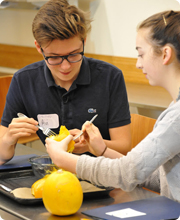Research and Clinical Trials
Through research and clinical trials, Seattle Children’s gastroenterologists and hepatologists are discovering new cures and treatments.
Many of these same gastroenterologists and hepatologists are leading pioneering research efforts that range from curing hepatitis C to finding new dietary therapies to treat inflammatory bowel disease (IBD).
Our doctors work to transform treatment and improve outcomes through research and clinical trials. Seattle Children’s Research Institute is 1 of the nation’s top 5 pediatric research centers. Ask your provider if there is a study in which your child may be eligible to participate.
We invite children and their families to participate in our studies. By participating in a research study, your child will have access to some of the latest GI treatment and therapies, and receive support and care from our research team.
Below is a list of our research efforts.
Inflammatory Bowel Disease (IBD)
 Avi Shapiro achieved remission from Crohn’s disease through a unique diet called the specific carbohydrate diet (SCD). Now, he has made it his mission to share the benefits of the diet with other kids like him.
Avi Shapiro achieved remission from Crohn’s disease through a unique diet called the specific carbohydrate diet (SCD). Now, he has made it his mission to share the benefits of the diet with other kids like him.The IBD Center brings a team of specialists together in one place to give your child and family the most complete care. Our doctors do research about the causes of the disease so we can find better treatments that improve the quality of life for children with IBD. From new pharmaceutical treatments to holistic nutritional therapy, we offer innovative therapies not offered elsewhere.
Seattle Children’s gastroenterologist Dr. David Suskind has discovered that a diet called the specific carbohydrate diet (SCD) can bring pediatric patients with active Crohn’s and ulcerative colitis into remission.
Hepatology Research
Hepatology is the study and treatment of liver diseases. Seattle Children’s is home to the only liver (hepatology) and liver transplant programs for children in the Pacific Northwest. Read more about our Hepatology Program and Liver Transplant Program.
Doctors in both programs are researching and developing new treatments for diseases that affect the liver in children. We’re able to offer many treatments that are available only through clinical studies and drug trials. This means our patients have access to some of the most current, state-of-the-art therapies.
Other research we participate in
- Childhood Liver Disease and Research Network
- Hepatitis B Research Network (Viral hepatitis)
- Nonalcoholic Steatohepatitis Clinical Research Network (NASH/fatty liver disease)
- Pediatric Acute Liver Failure Network (Includes the TRIUMPH drug trial)
- SPLIT Study Group (Liver transplantation)
Short Bowel Syndrome
 The experimental drug teduglutide had a life-changing effect on Brennan Henderson.
The experimental drug teduglutide had a life-changing effect on Brennan Henderson.The Intestinal Rehabilitation Program uses the latest treatments to help a child’s intestine work well if affected by disease (like short bowel syndrome), injury or a surgery that removed part of it. With recent advances in diet, medicine and surgery, we have greatly reduced the need for intestine transplants in children. Our ongoing research on short bowel syndrome helps us better understand this rare disorder and discover better treatment options.
Seattle Children's doctors were involved in a clinical trial to study the effectiveness of the drug teduglutide in treating children with short bowel syndrome. Read how the experimental drug had a life-changing effect on Brennan Henderson’s severe symptoms.
Participate in Research
You can help us answer questions about childhood health and illness, and help other children in the future. We invite children and their families to participate in our studies. By participating in a research study, your child will have access to some of the latest treatments and therapies, and will receive support and care from our research team. Participation is voluntary. Your child will receive the same quality care whether or not you participate.
Get answers to common questions about taking part in research, including how we protect your child’s health and safety during research. If you’re interested in learning more, please contact us at GIresearch@seattlechildrens.org.
Ways to Help
Private donations help our researchers launch studies that could lead to lifesaving treatments. Email us to learn about supporting Gastroenterology and Hepatology research.